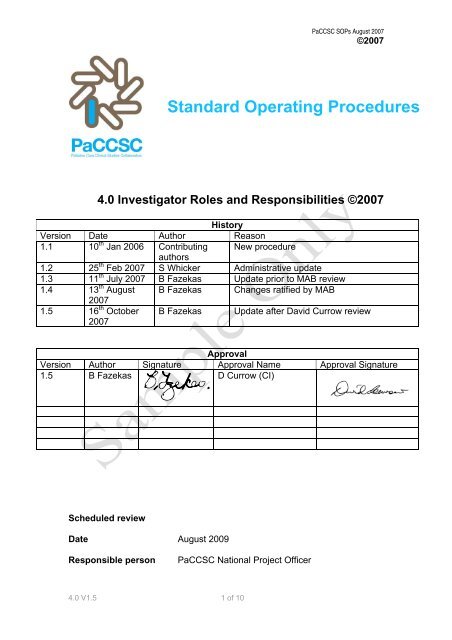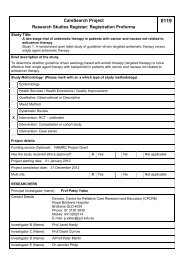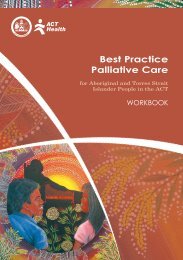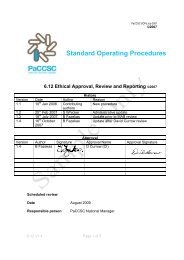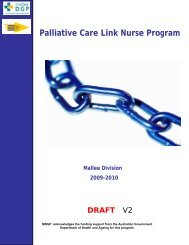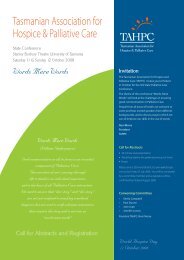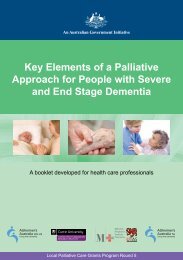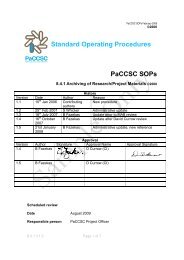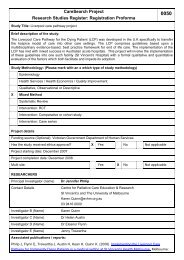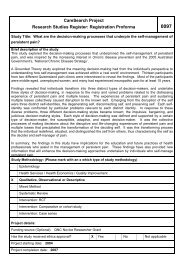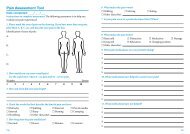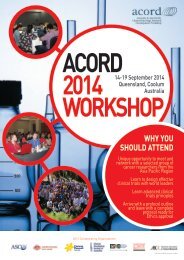Standard Operating Procedures - CareSearch
Standard Operating Procedures - CareSearch
Standard Operating Procedures - CareSearch
You also want an ePaper? Increase the reach of your titles
YUMPU automatically turns print PDFs into web optimized ePapers that Google loves.
PaCCSC SOPs August 2007<br />
©2007<br />
<strong>Standard</strong> <strong>Operating</strong> <strong>Procedures</strong><br />
4.0 Investigator Roles and Responsibilities ©2007<br />
History<br />
Version Date Author Reason<br />
1.1 10 th Jan 2006 Contributing New procedure<br />
authors<br />
1.2 25 th Feb 2007 S Whicker Administrative update<br />
1.3 11 th July 2007 B Fazekas Update prior to MAB review<br />
1.4 13 th August B Fazekas Changes ratified by MAB<br />
2007<br />
1.5 16 th October<br />
2007<br />
B Fazekas Update after David Currow review<br />
Approval<br />
Version Author Signature Approval Name Approval Signature<br />
1.5 B Fazekas D Currow (CI)<br />
Scheduled review<br />
Date August 2009<br />
Responsible person<br />
PaCCSC National Project Officer<br />
4.0 V1.5 1 of 10
PaCCSC SOPs August 2007<br />
©2007<br />
4.0 Investigator Roles and Responsibilities<br />
Purpose<br />
To outline the roles and responsibilities of clinical trial/study investigators in<br />
conducting research with participants.<br />
Investigators are responsible for ensuring that a clinical trial is properly<br />
conducted and that participants are adequately protected. Investigators must<br />
be properly qualified and trained with adequate experience to undertake the<br />
clinical trial in line with the requirements of the protocol. The site investigator<br />
may delegate significant clinical trial related duties to appropriately qualified<br />
and trained staff. It is ultimately the responsibility of the site investigator to<br />
ensure that all members of the clinical trial team understand and apply their<br />
obligation to ensure the protection of the rights, safety and well-being of<br />
participants.<br />
Other related SOPs<br />
Archiving of Research/Project Materials<br />
Adverse Event Reporting<br />
Essential Documents<br />
Ethical Approval, Review and Reporting<br />
Data Management<br />
Record Destruction<br />
Attachments<br />
Staff Signature Sheet for delegation of responsibilities<br />
References<br />
NHMRC National Statement on Ethical Conduct in Research Involving<br />
Humans 1999 (accessed 250207)<br />
http://www.nhmrc.gov.au/publications/_files/e35.pdf<br />
Guideline for Good Clinical Practice, ICH Harmonised Tripartite Guideline<br />
E6(R1) 1996 (accessed 250207)<br />
http://www.ich.org/LOB/media/MEDIA482.pdf<br />
Note for Guidance on Good Clinical Practice (CPMP/ICH/135/95). Annotated<br />
with TGA comments 2000 (accessed 250207)<br />
http://www.tga.gov.au/docs/pdf/euguide/ich/ich13595.pdf<br />
4.0 V1.5 2 of 10
PaCCSC SOPs August 2007<br />
©2007<br />
Definitions<br />
Case Report Form (CRF)<br />
A printed, optical, or electronic document designed to record all of the protocol<br />
required information to be reported to the coordinating site on each<br />
participant.<br />
Clinical Trial/Study<br />
Any investigation in human subjects intended to discover or verify the clinical,<br />
pharmacological and/or pharmacodynamic effects of an investigational<br />
product(s), and/or to study absorption, distribution, metabolism, and excretion<br />
of an investigational product(s) with the object of ascertaining its safety and/or<br />
efficacy. The terms clinical trial and clinical study are synonymous.<br />
Clinical Trial/Study Report<br />
A written description of a trial/study of any therapeutic, prophylactic, or<br />
diagnostic agent conducted in participants, in which clinical and statistical<br />
description, presentations, and analyses are fully integrated into a single<br />
report.<br />
Confidentiality<br />
Prevention of disclosure, to other than authorised individuals, of a sponsor’s<br />
proprietary information or a participants identity.<br />
Good Clinical Practice (GCP)<br />
A standard for the design, conduct, performance, monitoring, auditing,<br />
recording, analyses, and reporting of clinical trials that provides assurance<br />
that the data and reported results are credible and accurate, and that the<br />
rights, integrity, and confidentiality of participants are protected.<br />
Independent Ethics Committee (IEC)/Human Research Ethics<br />
Committees (HREC)<br />
An independent body (a review board or committee, institutional, regional,<br />
national or supranational), duly constituted of medical professionals and nonmedical<br />
members, whose responsibility it is to ensure the protection of the<br />
rights, safety and well-being of participants involved in a trial and to provide<br />
public assurance of that protection by, among other things, reviewing and<br />
approving/providing favourable opinion on the trial protocol, the suitability of<br />
the investigator(s), facilities, and the methods and material to be used in<br />
obtaining and documenting informed consent of the participants.<br />
Informed Consent<br />
A process by which a participants voluntarily confirms his or her willingness to<br />
participate in a particular trial, after having been informed of all aspects of the<br />
trial that are relevant to the participants decision to participate. Informed<br />
consent is documented by means of a written, signed and dated consent<br />
form, unless otherwise dealt with in a institutional ethics approved trial<br />
protocol.<br />
Interim Clinical Trial/Study Report<br />
4.0 V1.5 3 of 10
4.0 V1.5 4 of 10<br />
PaCCSC SOPs August 2007<br />
©2007<br />
A report of intermediate results and their evaluation based on analyses<br />
performed during the course of a trial.<br />
Investigational Product<br />
A pharmaceutical form of an active ingredient or placebo being tested or used<br />
as a reference in a clinical trial, including a product with a marketing<br />
authorisation when used or assembled (formulated or packaged) in a way<br />
different from the approved form, or when used for an unapproved indication,<br />
or when used to gain further information about an approved use.<br />
Investigator<br />
A person responsible for the conduct of a clinical trial at a trial site. If a trial is<br />
conducted by a team of individuals at a trial site, the investigator is the<br />
responsible leader of the team and may be called the principal investigator.<br />
The investigator should be qualified by education, training and experience to<br />
assume responsibility for the proper conduct of the study, should be<br />
thoroughly familiar with the use of the investigational product and be aware of,<br />
and comply with, the applicable regulatory requirements. The qualifications<br />
should be appropriate to their role in the study.<br />
Investigator/Institution<br />
An expression meaning “the investigator and/or institution, where required by<br />
the applicable regulatory requirements”<br />
Lead Investigator<br />
The investigator who leads the study protocol development and takes the<br />
responsibility for the coordination of investigators at different centres<br />
participating in a multi-site trial.<br />
Multi-centre Trial<br />
A clinical trial conducted according to a single protocol but at more than one<br />
site, and therefore, carried out by more than one site investigator.<br />
Participant<br />
An individual who participates in a clinical trial, either as a recipient of the<br />
investigational product(s) or as a control.<br />
Protocol<br />
A document that describes the objective(s), design, methodology, statistical<br />
considerations, and organisation of a trial. The protocol usually includes the<br />
background and rationale for the trial, but these could be provided in other<br />
protocol referenced documents. Throughout the ICH GCP Guideline the term<br />
protocol refers to protocol and protocol amendments.<br />
Protocol Amendment<br />
A written description of a change(s) to, or a formal clarification of a protocol.<br />
Site investigator<br />
Any individual member of the clinical team who leads the implementation of<br />
the protocol at the individual sites. They may designate investigator<br />
responsibilities to sub-investigators.
PaCCSC SOPs August 2007<br />
©2007<br />
Sub-investigator<br />
Any individual member of the clinical trial team designated and supervised by<br />
the investigator at a trial site to perform critical trial-related procedures and/or<br />
to make specific trial-related decisions.<br />
Well-being (of the trial participants)<br />
The physical and mental integrity of the subjects participating in a clinical trial.<br />
4.0 V1.5 5 of 10
PaCCSC SOPs August 2007<br />
©2007<br />
Procedure<br />
Investigator’s Qualifications and Agreements<br />
The investigators should be qualified by education, training and experience to<br />
assume responsibility for the conduct of the clinical trial. The Coordinating<br />
Investigator must ensure that all participating investigators and clinical trial<br />
team members meet these requirements and that the relevant documentation<br />
is filed with the Coordinating Investigator’s study documents and a copy<br />
provided to the Independent Ethics Committee as required.<br />
The investigator must be familiar with the investigational product, the protocol,<br />
additional information sources which support the protocol and ensure the<br />
clinical trial complies with GCP.<br />
The Coordinating Investigator may require that training and education<br />
sessions are held and resources are developed to ensure that all<br />
investigators, subinvestigators and remaining members of the clinical trial<br />
team are adequately informed to implement the protocol and maintain the<br />
protection of the rights, safety and well-being of human subjects.<br />
The Coordinating Investigator may delegate key tasks and responsibilities to<br />
other study personnel based on their skill level, qualifications and the tasks<br />
required. The key tasks for most clinical studies likely to be conducted by<br />
PaCCSC are outlined in the Signature sheet for delegation of responsibilities.<br />
This should be completed at each site and held in the files for that site. New<br />
personnel or new delegation of tasks should be updated on this sheet as<br />
appropriate. This sheet will be checked as part of site monitoring visits.<br />
Adequate Resources<br />
The investigator should be able to demonstrate the potential of the centre for<br />
recruiting the subjects in line with protocol requirements, have sufficient time<br />
to conduct and complete the trial, and have access to sufficient staff to<br />
conduct and complete the trial.<br />
Communication with the Independent Ethics Committee (IEC)<br />
Before commencement of a trial, written approval from the relevant IEC on the<br />
application to implement the protocol must have been received. Any<br />
documentation modified during the course of the trial must be submitted to the<br />
IEC.<br />
Compliance with Protocol<br />
The investigator/institution should conduct the trial in line with the protocol<br />
approved by the IEC. Any deviations from the protocol must be documented<br />
by the Coordinating Investigator and approved by the relevant IECs.<br />
Investigational Product(s)<br />
4.0 V1.5 6 of 10
PaCCSC SOPs August 2007<br />
©2007<br />
The investigator/institution is accountable for the investigational product(s) at<br />
individual trial sites. The requirements for accountability and storage for the<br />
investigational product(s) will be addressed in a trial specific SOP for each<br />
trial, which may vary slightly between individual sites. The investigator should<br />
ensure that the investigational products are used in accordance with the<br />
protocol.<br />
Informed Consent of Trial Participants<br />
Prior to commencement of the trial, the investigator will have written approval<br />
from the IEC for the use of the participant consent form and any participant<br />
information sheets to be provided. Where possible the same information sheet<br />
and consent forms will be used at all sites and only modified where required<br />
by the local IEC’s.<br />
Participant information sheets and consent forms should be written and<br />
presented in a format understandable to persons of a Year 7 reading level (12<br />
years of age) and include the following information:<br />
• Clear identification of the institution convening the trial, the<br />
project title, the coordinating investigator and other<br />
investigators (including contact details)<br />
• Clear purpose of the study and/or benefits to the participant<br />
• That involvement in the project by the participant is voluntary<br />
and that participants are free to withdraw consent at any<br />
time, and to withdraw permission for use of any unprocessed<br />
data previously supplied for the trial<br />
• Details of what participant involvement in the trial will require<br />
such as interviews, completion of questionnaires, use of any<br />
medications, surgery, investigations, or review of patient<br />
case notes, and estimated time commitment<br />
• Explanation about randomisation, blinding and placebo use if<br />
appropriate<br />
• Details about the financial and time burden involved in<br />
participating, such as out of pocket expenses and extra<br />
clinical appointments<br />
• An explanation of all the risks and adverse events (nature<br />
and probability) to the participant<br />
• A clear statement that involvement in the trial, or withdrawal<br />
from the trial will not affect ongoing clinical care nor service<br />
involvement<br />
• Advice as to arrangements to be made to protect<br />
confidentiality of data, including that confidentiality of<br />
information provided is subject to legal limitations and<br />
duration of storage of data<br />
• Details of the IEC that approved the trial protocol<br />
• Details of proposed dissemination of results including access<br />
to results by participants as they become available. Each<br />
4.0 V1.5 7 of 10
PaCCSC SOPs August 2007<br />
©2007<br />
protocol provides specific information about access to results<br />
for participants following the study closure<br />
• Name and contact details of a site trial team member and<br />
the Coordinating Investigator who can answer questions<br />
regarding participant involvement<br />
• Name and contact details of IEC person who can<br />
independently answer questions regarding the trial<br />
• Documents any payments or reimbursements received by<br />
the investigators as a result of the participant consenting to<br />
the trial<br />
Participant information sheets should be provided to the participant or<br />
participant’s legally acceptable representative or proxy (dependant on<br />
individual State or Territory requirements) for consideration and/or discussion<br />
with a representative of the trial, prior to reviewing and completing a signed<br />
and dated participant consent form.<br />
When obtaining informed consent in persons highly dependent on medical<br />
care including palliative care patients, the participant consent forms and<br />
information sheets must also comply with the additional requirements for<br />
obtaining informed consent in special cases as outlined in the NHMRC<br />
National Statement on Ethical Conduct in Research Involving Humans –<br />
persons highly dependent on medical care (section 6). Specifically, there is a<br />
need to acknowledge in the informed consent processes that:<br />
● the giving of free and informed consent can be compromised<br />
by the effect of the medical condition on the person’s capacity<br />
to determine their own participation or to communicate their<br />
concerns or wishes<br />
● the person may be reluctant to refuse consent in fear that it<br />
may compromise their ongoing medical treatment<br />
● the prospect of benefit from research participation is neither<br />
exaggerated nor used to justify a higher risk than that involved<br />
in the patient’s current treatment<br />
● the needs and wishes of participants to spend time as they<br />
choose, particularly with family members<br />
The Site Investigator must retain a copy of all signed consent forms within<br />
their Essential Documents.<br />
Records and Reports<br />
Each investigator is responsible for the data on the CRFs to be accurately and<br />
legibly recorded in line with ICH GCP requirements, maintained in line with<br />
the PaCCSC SOPs for Essential Documents, CRF Completion, Data<br />
4.0 V1.5 8 of 10
PaCCSC SOPs August 2007<br />
©2007<br />
Management and Archiving of Research/Project Materials and destroyed in<br />
line with the Record Destruction SOP.<br />
The Principal Investigator at individual sites is responsible for the provision of<br />
interim and final written reports to the site IEC in consultation with the<br />
Coordinating Investigator. Copies will be maintained by the coordinating and<br />
principal investigator, and the National Manager.<br />
Safety Reporting<br />
The reporting of all adverse and serious adverse events of studies will be in<br />
line with the PaCCSC Adverse Event Reporting SOP.<br />
All serious adverse events should be reported immediately, within 24 hours by<br />
phone and fax, of becoming aware of the event, (adverse events less than 7<br />
days) and to the PaCCSC coordinating agency except for those serious<br />
adverse events that the study protocol identifies as not needing immediate<br />
reporting. The immediate and follow-up reports should be followed promptly<br />
by a detailed written report.<br />
The investigator should also provide any additional material requested by the<br />
PaCCSC Coordinating agency or the HREC such as autopsy or medical<br />
reports.<br />
Premature Termination or Suspension of a Trial<br />
If a trial is terminated or suspended prematurely, the investigator/institution<br />
will immediately inform all trial participants of reasons and future medical<br />
management. Each IEC will also be immediately informed and followed up<br />
with a written explanation of the termination or suspension.<br />
Progress reporting<br />
The investigator is to ensure that all contractual obligations are met including;<br />
• Initiation and monitoring visit compliance<br />
• Budget and finance accounting<br />
• IEC progress and annual reporting, with copies to the PaCCSC<br />
Coordinating agency<br />
• Progress reports as requested by the PaCCSC Coordinating agency<br />
4.0 V1.5 9 of 10
PaCCSC<br />
Staff Signature Sheet<br />
PaCCSC SOPs August 2007<br />
©2007<br />
Study Code Site Code Protocol Number INVESTIGATOR NAME Approval numbers<br />
Print Full Name & Title Signature Initials *Study Role<br />
**Key Delegated<br />
Study Task(s)<br />
See list below<br />
Duration<br />
From<br />
To<br />
Investigator’s<br />
Authorisation<br />
of delegated<br />
tasks<br />
Chief Investigator 1, 2, 3, 7, 8, 9, 10, 14,<br />
19<br />
Sub Investigator 1, 2, 3, 7, 8, 9, 10, 14,<br />
19<br />
Site Coordinator 21, 16, 18, 20, 21,<br />
Study Nurse 1, 4, 5, 6, 11, 12, 13,<br />
17,<br />
Pharmacist 22, 23<br />
Coordinating Site 15, 16, 18, 20, 21,<br />
*Identification of study role includes but is not limited to subinvestigators, study nurses, pharmacist (when appropriate) and data recorders. List individuals delegated significant<br />
study-related tasks (ICH GCP 4.1.5). Signature/Initials required for all persons authorised to make entries and/or corrections to Case Report Forms (ICH GCP 8.3.24)<br />
** Identify key study tasks when delegated by the investigator. Examples of key study tasks include:<br />
1 Informed Consent collection 7 Review of blood samples, MDRD. 13 CRF Completion 19 Study conclusion signature<br />
2 Medical History review 8 Review of incl./exclusion criteria 14 CRF Signature 20 Archive functions<br />
3 Con. Meds review 9 Safety assessments 15 Data query initiation 21 Monitoring<br />
4 Measure of vital signs 10 Authorisation to randomise 16 Data Query Completion 22 Randomisation<br />
5 Collection of blood samples 11 Product dispensing 17 Product delivery<br />
6 Handling of blood samples 12 Product Accountability 18 Communications<br />
4.0 V1.5 10 of 10<br />
23<br />
Handling, manufacture, storage of<br />
investigational product


